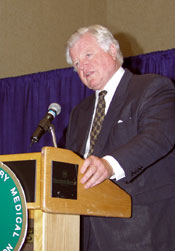Kennedy: Need for veterinary medicine never greater
Those attending the AVMA Political Action Committee luncheon July 16 at the AVMA Annual Convention in Boston were treated to a piece of Camelot—America's love affair with the Kennedys—when Sen. Edward M. Kennedy, accompanied by Splash, his Portuguese Water Dog, spoke about how veterinarians contribute not only to the health and well-being of animals, but also of humanity. Kennedy has represented Massachusetts in the Senate for nearly 40 years. He was elected in 1962 to finish the term of his brother, President John F. Kennedy. Today, Kennedy is the third most senior member in the Senate, and he chairs the Senate committee responsible for matters pertaining to health, education, labor, and human resources. The senator said he was pleased to follow last year's PAC luncheon speaker, Sen. Orrin Hatch, with whom he has partnered in support of biomedical research initiatives. "Usually, when Orrin Hatch and I hook up on a bill, people say, 'Well, one of them hasn't read it,'" he said, referring to his and the conservative Utah senator's differing political philosophies. "There are areas of difference, but Sen. Hatch and I always try to find common ground in terms of the investments in health care and in research, which are so important," Kennedy said. The AVMA holding its annual convention in Boston is appropriate, he said, given the esteemed history of the Tufts University School of Veterinary Medicine. Kennedy pointed out how the veterinary school was made possible by $10 million in federal funding. "As the only school of veterinary medicine in New England, Tufts is training a new generation of veterinary practitioners and scientists to serve the needs of New England and the entire nation in this new century of life sciences," he said. Thanks to the quality of education offered at American veterinary schools like Tufts, he said, the nation leads the world in veterinary medicine and the world recognizes the "remarkable" contributions made by U.S. veterinarians to animal health. "Never has the need for veterinary medicine been greater," Kennedy said, noting how exotic diseases that threaten human health are only a plane ride away. Nothing illustrates this better than West Nile Virus outbreak in the Northeast. Kennedy noted that it was a veterinary pathologist who first identified the virus. "Countless lives may have been saved by this prompt and accurate diagnosis," he said. The outbreak revealed serious deficiencies in the nation's preparedness to deal with the outbreak of an infectious disease, according to Kennedy. Precious hours elapsed between the initial diagnosis and its confirmation because of poor communication between veterinarians and experts in human pathology. "Obviously there need to be close links between animal health agencies and public health agencies, and those links clearly need to be stronger," Kennedy said. No one knows what new diseases are next to threaten the United States, but the experiences of the European community with foot-and-mouth disease and bovine spongiform encephalopathy show the possibilities. The senator believes the greatest threat of all, however, is that of biological terrorism. Kennedy listed this among the threats of nuclear proliferation and cyber-terrorism. "It seems that in all of these areas we ought to be prepared, we ought to be alert, and we ought to be involved," he said. Last year, he and Sen. Bill Frist of Tennessee introduced, and Congress passed, legislation that strengthened the ability of public health agencies to detect and respond to disease outbreaks, whether the cause is natural or deliberate. The proposal, Kennedy observed, brings together the heads of the Health and Human Services and Agriculture departments, and other federal officials to plan for disease emergencies. "In a disease emergency, rapid diagnosis and swift communication will be essential in saving lives, and these new investments will save precious hours in a crisis," he said. Kennedy also mentioned the obvious part veterinarians play in caring for the pets that "brighten so many millions of lives, my own included." He noted how he himself has followed President Harry S. Truman's advice that if you want a friend in Washington, D.C., get a dog. "My dog Splash fills that bill to perfection," Kennedy said. He devoted a substantial portion of his speech to Splash, who sometimes accompanies Kennedy on Capitol Hill. "He only bites Republicans," Kennedy joked before the lunch. Unscripted comments from the senator Should President Bush authorize federal funding for embryonic stem cell research? What are the chances the Patients' Bill of Rights bill will pass in the House? Would Bush veto it? Would you support an office of veterinary research in the NIH? | ||
 Sen. Edward Kennedy
Sen. Edward Kennedy